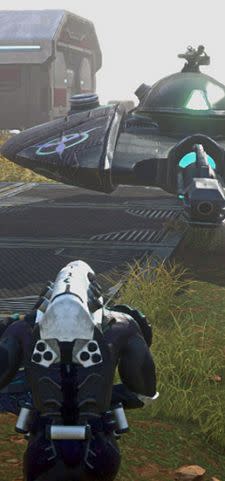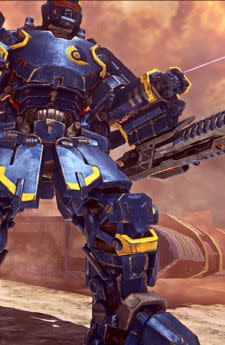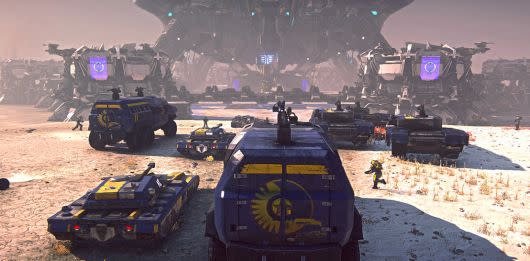PAX East 2014: PlanetSide 2's Higby on weekly updates
It's been three months since PlanetSide 2 started updating once every week, if you don't count one update that was pushed back simply because it wasn't quite ready. As creative director Matt Higby put it to me at this year's PAX East, the schedule comes second to making sure that every update is the best it can be. But it's still been quite a ride, and it means that the game has kept up a schedule that's astonishingly fast.
More than a year out from launch, Higby has a lot to say about the game's development process as well as the updates it's already undergone. It's not an unmitigated success story, but it's filled with a lot of lessons and improvements. And like any MMO, the game's development is far from finished. In PlanetSide 2's case, it's a complex process that requires supporting new players, veterans, casual gamers, and professional gaming, sometimes in unconventional fashions.

While the next update to the game (which was pushed back) will be a balance and tuning update for the Terran Republic, the game's next major update is the implementation of the directive system. It's the PlanetSide 2 version of achievements, meant to serve as incentive for players in a variety of ways.
For one, it serves as a method to draw players through a variety of different playstyles. It allows players to see the variety of playstyles that are available while also encouraging players not to be locked in to just the familiar routine. That's not to say that you can't advance in your favorite class, simply that it both pulls new players to see all of their options and encourages old players to try something out.
What do you get for fulfilling directives? Aside from seeing points added to a score on your account, you'll snag new titles and cosmetics. It may also tie into the implant system in the future, although nothing's been determined for sure yet.
Guiding new players in the game is a constant struggle for the developers, Higby told me. The nature of the game means that there are no safe cradles for new players, since the game requires both the best players and worst players to be on the same server. The goal is to have a variety of systems in place to guide new players without affording a direct advantage to players of any kind.
Higby explained that the Mission system was bare-bones at its first implementation, but it's an illustration of what the team is trying to do to help make the system more comprehensible. Players who have been in the game for some time weren't particularly engaged by the early implementation -- after all, it just tells you how to play the game, which was pointless for thoe who already knew how. But for new players still learning how to play, having the game clarify what needs to be done is vital.
Discussions are always ongoing regarding how the game can best welcome and support new players. There's been talk about adding in a mentoring system; mentoring a new player would award a percentage of that player's earned experience to the mentoring players. But at the end of the day, the developers want to avoid potentially handicapping player skill by giving someone an unfair advantage. After all, even if someone's new to the game, he or she may be quite skilled at FPS games; there's no advantage to giving players like that a bonus on top of their skill.
It's an iterative process, though. The weekly update schedule has led to stumbles and downtime issues, and the obvious problems have been a natural outgrowth of having a very short timeline coupled with a drive to make each update as rich as possible. Everyone working on the game is constantly managing updates; instead of handling these patches once every other month, it's every week.

As it stands now, the developers have about a year's worth of updates planned, but only features within the next two months are really locked into place. Depending on what's most important at any given moment, planned elements can be moved around and altered, allowing the team to move quickly and produce updates that speak to the most urgent issues facing the playerbase.
The weekly updates do create more problems, but Higby stressed that they also allow the developers to solve smaller problems and patch things up at a faster rate. A prime example is the revamp of the continents. The first continent-wide revamp was well-received, but it also took six months of development time. Instead of requiring the devs to shunt huge efforts into these titles, the weekly updates encourage refining the one or two weakest bases on a regular basis.
It does prevent the team from doing some larger things that would just take too much time, and there are flavors of the week that come up.
Meanwhile, Higby believes the balance of the game has been struck. Absolute balance in an asymmetrical game is impossible; it's a matter of nudging the balance in small places such that all three factions feel balanced and unique. Higby also stressed that one of the main points in development is creating things that feel fun and overpowered when you're using them, even when they aren't actually unbalanced numbers-wise.
Of course, with a balanced game that's competitive by nature, how does Higby prioritize making the platform attractive for professional gaming? As he sees it, the worst thing that a company can do for a game is to sow up and declare that the game is an e-sport. It needs to be community-driven, and the best thing is to support such a community springing up organically, not force it into existence.
That's not to say there are no obligations for SOE; the company has to support and encourage competitive play. A server has been opened specifically for player communities organizing and running tournaments. But Higby believes the company needs to support the existing community rather than try to recruit and will it into existence.
So with a year and a half of development, how does the game stack up compared to its predecessor? A lot of intentional differences were in place throughout development to make PlanetSide 2 a different game from PlanetSide. In many ways, the older game had more strategic depth, but that was by design. It's always been a goal of the developers to layer in new elements, improve the game over time, expand, update, and iterate. There are always more improvements to be made, but Higby's goal is to create a game that can continue to grow and become better and better over time.

Massively's on the ground in Boston during the weekend of April 11th to 13th, bringing you all the best news from PAX East 2014. Whether you're dying to know more about WildStar, Landmark, or any MMO in between, we aim to have it covered!


